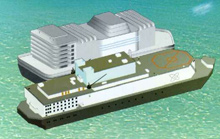
Mock illustration from Discover Magazine.
Russia plans to build floating nuclear power stations in the Arctic in order to exploit its oil and gas reserves. The power stations, which will consist of two nuclear reactors atop a steel platform, will allow Gazprom to power its drills in the Arctic’s notoriously difficult waters. The floats would also maintain their own waste and only need to be serviced every 12-14 years.
The first nuclear power plant prototype will be finished next year. Four more are scheduled to be built following an agreement between the state nuclear corporation, Rosatom, and Yakutiya, a republic in northern Siberia.
Environmentalists were up in arms over the announcement, as a nuclear accident in the Arctic could be a disaster. A spokesperson from Bellona, a Norwegian environmental NGO, commented on Russia’s plan:
“It is highly risky. The risk of a nuclear accident on a floating power plant is increased. The plants’ potential impact on the fragile Arctic environment through emissions of radioactivity and heat remains a major concern. If there is an accident, it would be impossible to handle.”
When the Chernobyl incident occured in 1986, nuclear fallout poisoned the grass in the northern tundra of Scandinavia hundreds of miles away, permanently devastating the local Sami economic activity of reindeer herding.
A more likely occurence in regards to the floating power stations, though, is the dumping of radioactive waste directly into the water. Russia has a history of allowing nuclear submarines to simply decompose in the ocean like radioactive time bombs, despite British offers to help manage their decommisioning and clean-up.
There is currently a multilateral effort underway to clean up nuclear waste in the Kola Peninsula, but Russia still allows a good amount of nuclear reactors to decay into the environment.
Russia is also considering constructing nuclear power plants on land to provide energy for its settlements in the North. In the eyes of the West, it seems that Russia is living up to its reputation of completely disregarding the environment – particularly in an area as sensitive as the Arctic.
News links:
Russia to build floating Arctic nuclear power stations, The Guardian
Russia Plans to Power Arctic Oil Drilling With Floating Nuclear Plants, Discover Magazine